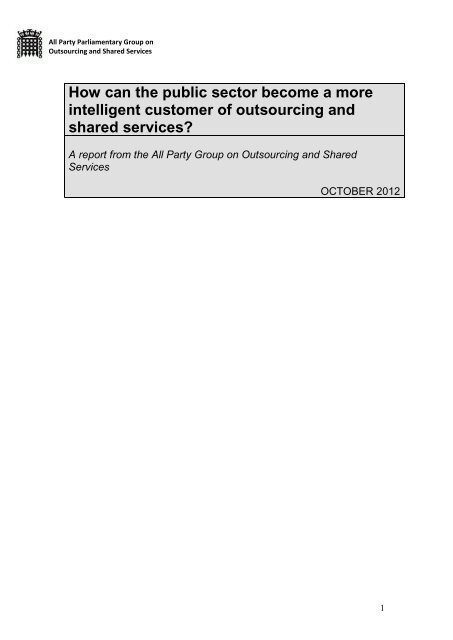How can the public sector become a more intelligent customer of ...
How can the public sector become a more intelligent customer of ...
How can the public sector become a more intelligent customer of ...
Create successful ePaper yourself
Turn your PDF publications into a flip-book with our unique Google optimized e-Paper software.
All Party Parliamentary Group on<br />
Outsourcing and Shared Services<br />
<strong>How</strong> <strong>can</strong> <strong>the</strong> <strong>public</strong> <strong>sector</strong> <strong>become</strong> a <strong>more</strong><br />
<strong>intelligent</strong> <strong>customer</strong> <strong>of</strong> outsourcing and<br />
shared services?<br />
A report from <strong>the</strong> All Party Group on Outsourcing and Shared<br />
Services<br />
OCTOBER 2012<br />
1
All Party Parliamentary Group on<br />
Outsourcing and Shared Services<br />
FOREWORD<br />
The All Party Group on Outsourcing and<br />
Shared Services was set up in July 2011 with<br />
<strong>the</strong> aim to raise awareness <strong>of</strong> <strong>the</strong> benefits and<br />
best practices <strong>of</strong> <strong>the</strong> outsourcing and shared<br />
services industries; address <strong>the</strong> issues that<br />
face <strong>the</strong> industry today; and, to promote<br />
dialogue and understanding between industry<br />
representatives and Members <strong>of</strong> Parliament.<br />
Outsourcing represents approximately 8% <strong>of</strong><br />
<strong>the</strong> UK economy 1 with approximately 40% <strong>of</strong><br />
contracts coming from <strong>the</strong> <strong>public</strong> <strong>sector</strong>. But<br />
<strong>public</strong> <strong>sector</strong> outsourcing contracts have<br />
commonly been <strong>the</strong> focus <strong>of</strong> criticism for<br />
failing to deliver on time and achieve stated<br />
savings, for <strong>the</strong> lack <strong>of</strong> due diligence by ei<strong>the</strong>r<br />
or both <strong>the</strong> <strong>customer</strong> and supplier, and for<br />
sub-par contract management arrangements<br />
by ei<strong>the</strong>r or both parties.<br />
The guiding principle behind this report,<br />
however, and one recognised by <strong>the</strong> Group, is<br />
that outsourcing, when delivered well, has an<br />
important role to play in <strong>the</strong> Government’s<br />
plan for deficit reduction, and <strong>can</strong> make <strong>the</strong><br />
vital savings that Government needs. When<br />
Ian Wat<strong>more</strong>, former Chief Operating Officer<br />
at <strong>the</strong> Cabinet Office, addressed <strong>the</strong> Group in<br />
November 2011, he said that outsourcing and<br />
shared services were “at <strong>the</strong> heart <strong>of</strong> <strong>the</strong><br />
efficiency and reform agenda.”<br />
We hope that <strong>the</strong> recommendations in this<br />
report will provide insight into <strong>the</strong> industry and<br />
inform best practice in <strong>public</strong> <strong>sector</strong><br />
outsourcing in <strong>the</strong> future. I would like to thank<br />
everyone who submitted evidence to <strong>the</strong><br />
Group, <strong>the</strong> Group’s members and <strong>the</strong> National<br />
Outsourcing Association who covered <strong>the</strong><br />
costs <strong>of</strong> <strong>the</strong> report.<br />
Bob Blackman MP, Chair<br />
OCTOBER 2012<br />
HOW THE INQUIRY WAS<br />
ORGANISED<br />
1 Oxford Economics for <strong>the</strong> Business Services Association, April 2011<br />
The Group acknowledges that <strong>the</strong>re are<br />
many competing views <strong>of</strong> what counts<br />
as outsourced and shared services. For<br />
simplicity, <strong>the</strong> Group took an outsourced<br />
or shared service to be a service or<br />
services supplied by a third party.<br />
In compiling <strong>the</strong> evidence, <strong>the</strong> Group<br />
aimed to draw out common <strong>the</strong>mes from<br />
all <strong>the</strong> contributions and testimonials<br />
received, and we hope that <strong>the</strong> resulting<br />
recommendations have a wide<br />
application to all <strong>public</strong> <strong>sector</strong> contracts.<br />
The report comprises <strong>of</strong> findings from<br />
two evidence sessions in <strong>the</strong> House <strong>of</strong><br />
Commons with witnesses from<br />
Whitehall, Local Government and<br />
industry. The Group also ran a<br />
consultation style process between July<br />
and October 2011, where members <strong>of</strong><br />
<strong>the</strong> outsourcing industry and <strong>public</strong><br />
<strong>sector</strong> bodies that use outsourcing and<br />
shared services were invited to submit<br />
written evidence to <strong>the</strong> Group and<br />
examples <strong>of</strong> best practice. The<br />
consultation process ended with two<br />
industry roundtable discussions,<br />
facilitated by <strong>the</strong> National Outsourcing<br />
Association, which aimed at formulating<br />
some guidelines for action.<br />
The report is arranged into four sections:<br />
addressing <strong>the</strong> skills deficit; true<br />
partnership working; outcomes-based<br />
solutions; and <strong>the</strong> future <strong>of</strong> outsourcing<br />
and shared services in <strong>the</strong> <strong>public</strong> <strong>sector</strong>.<br />
2
All Party Parliamentary Group on<br />
Outsourcing and Shared Services<br />
CONTENTS<br />
Recommendations in full Pg. 4<br />
Addressing <strong>the</strong> skills deficit Pgs. 5-6<br />
True partnership working Pgs. 6-8<br />
Outcomes-based solutions Pgs. 9-10<br />
Future <strong>of</strong> outsourcing and shared services in <strong>the</strong> <strong>public</strong> <strong>sector</strong> Pgs 10<br />
Appendix A Outsourcing in <strong>the</strong> UK Pg. 11<br />
Appendix B Written evidence Pg. 12<br />
3
All Party Parliamentary Group on<br />
Outsourcing and Shared Services<br />
RECOMMENDATIONS IN PRIORITY ORDER<br />
The Group would like to see <strong>the</strong> following recommendations implemented by Government<br />
and suppliers within an 18 month timeframe:<br />
1. Government should aim to act as a better educated commissioner <strong>of</strong><br />
services.<br />
2. Clients should ensure that business objectives are clearly and simply<br />
stated from early on in <strong>the</strong> procurement process, and shared by all<br />
parties. If business objectives change in <strong>the</strong> near to long term, <strong>the</strong><br />
contract should give <strong>the</strong> supplier <strong>the</strong> ability to make reasonable<br />
adjustments to service delivery.<br />
3. Clients should place <strong>more</strong> importance on outcomes, ra<strong>the</strong>r than<br />
processes, and ensure that outcomes are always clearly stipulated in<br />
contracts.<br />
4. Where possible, social outcomes should be articulated in contracts<br />
and <strong>the</strong> benefits <strong>of</strong> those social outcomes for <strong>the</strong> general <strong>public</strong><br />
should be celebrated when achieved.<br />
5. Outsourcing and shared services contracts should, where<br />
appropriate, make budgetary provisions for suppliers to <strong>of</strong>fer training<br />
and education for clients as part <strong>of</strong> <strong>the</strong> services package.<br />
6. Early and <strong>more</strong> flexible engagement is a desirable way <strong>of</strong> aligning <strong>the</strong><br />
interests <strong>of</strong> <strong>the</strong> supplier and <strong>the</strong> <strong>customer</strong>. Both suppliers and<br />
<strong>customer</strong>s need <strong>more</strong> clarity on how <strong>the</strong>y should conduct <strong>the</strong>se preprocurement<br />
conversations to mutual benefit.<br />
7. Clients should standardise service specifications where possible so<br />
that o<strong>the</strong>r potential participants within <strong>the</strong> <strong>sector</strong> <strong>can</strong> follow a<br />
successful model. It is preferable to maximise <strong>the</strong> commonality that<br />
exists between bodies ra<strong>the</strong>r than demand unnecessary individual<br />
bespoke services.<br />
8. It is critical for newly created arm’s length bodies to review and<br />
adopt pre-existing successful service models ra<strong>the</strong>r than necessarily<br />
constructing <strong>the</strong>ir own systems from scratch.<br />
9. Government should ensure that <strong>the</strong>re is a robust and effective device<br />
through which best practice guidance <strong>can</strong> be communicated to<br />
<strong>public</strong> <strong>sector</strong> procurement teams.<br />
10. Both Government and suppliers need to educate <strong>the</strong>ir employees so<br />
<strong>the</strong>y clearly understand <strong>the</strong> benefits <strong>of</strong> outsourcing and that <strong>the</strong>y <strong>can</strong><br />
act as partners to achieve mutually positive outcomes.<br />
4
All Party Parliamentary Group on<br />
Outsourcing and Shared Services<br />
1. ADDRESSING THE SKILLS DEFICIT<br />
A repeated criticism levelled against government outsourcing projects, particularly those at<br />
<strong>the</strong> larger end <strong>of</strong> <strong>the</strong> scale, has been that <strong>the</strong> people who commission <strong>the</strong> projects lack <strong>the</strong><br />
commercial expertise and nous to be <strong>intelligent</strong> buyers, and <strong>the</strong> people who eventually<br />
manage or lead <strong>the</strong> project similarly lack <strong>the</strong> necessary skills to do so. This skills deficit and<br />
lack <strong>of</strong> leadership culture has been acknowledged as a key cause for failure in many projects<br />
in recent reports by <strong>the</strong> Public Administration Select Committee (PASC) on Government and<br />
IT and <strong>the</strong> National Audit Office on Shared Services.<br />
The 2011 PASC report on Government and IT for instance found that: “Managing suppliers is<br />
as important as deciding who to contract with in <strong>the</strong> first place. To be able to perform both <strong>of</strong><br />
<strong>the</strong>se functions government needs <strong>the</strong> capacity to act as an <strong>intelligent</strong> <strong>customer</strong>. This<br />
involves having a small group within government with <strong>the</strong> skills to both procure and manage a<br />
contract in partnership with its suppliers. Currently <strong>the</strong> Government seems unable to strike <strong>the</strong><br />
right balance between allowing contractors enough freedom to operate and ensuring <strong>the</strong>re<br />
are appropriate controls and monitoring in-house. The Government needs to develop <strong>the</strong><br />
skills necessary to fill this gap. This should also involve recruiting <strong>more</strong> IT pr<strong>of</strong>essionals with<br />
experience <strong>of</strong> <strong>the</strong> SME <strong>sector</strong> to help deliver <strong>the</strong> objective <strong>of</strong> greater SME involvement 2 .”<br />
According to Ian Wat<strong>more</strong>, former Chief Operating Officer at <strong>the</strong> Cabinet Office, in his<br />
evidence to <strong>the</strong> Select Committee, Government had, "…Ei<strong>the</strong>r abdicated, giving it all away,<br />
or…retained an army, which has just added to cost and bureaucracy on both sides." He<br />
suggested that <strong>the</strong> government needed a, "Smaller <strong>intelligent</strong> group that <strong>can</strong> procure and<br />
manage a contract in partnership, and hold <strong>the</strong>m to account when <strong>the</strong>y need to, but help <strong>the</strong>m<br />
fix things when <strong>the</strong>y need to as well." He said that this was a difficult skill set to find but that<br />
<strong>the</strong> current Government was "buying it in".<br />
A similar view also emerged from <strong>the</strong> written evidence that <strong>the</strong> Group collected. Many<br />
suppliers echoed <strong>the</strong>ir frustration that <strong>the</strong>y were not dealing with <strong>public</strong> <strong>sector</strong> staff with a high<br />
enough level <strong>of</strong> expertise and skills. O<strong>the</strong>rs provided <strong>more</strong> specific examples <strong>of</strong> things going<br />
wrong in-house:<br />
Allan Robertson, former president <strong>of</strong> <strong>the</strong> Chartered Institute for Purchasing and former board<br />
member and Chief Officer to several Government departments, put some poor buying down<br />
to lack <strong>of</strong> training and misunderstanding <strong>of</strong> how to operate under procurement regulations:<br />
“With fragmented buying <strong>the</strong>re is difficulty in justifying staff gaining market and product<br />
expertise as any one organisation may not be able to justify <strong>the</strong> training <strong>of</strong> expert staff…The<br />
rules under which <strong>public</strong> <strong>sector</strong> procurement staff operate, both under standing orders if a<br />
local authority, and also under EU Regulations inhibit <strong>the</strong> actions and innovativeness <strong>of</strong> <strong>the</strong><br />
buyer... EU rules need to be followed but <strong>the</strong>y do allow considerable flexibility on such<br />
aspects as negotiation if <strong>the</strong>y are initially spelt out in <strong>the</strong> tender. Many buyers I have met do<br />
not realise <strong>the</strong>y <strong>can</strong> negotiate or are unwilling to do so.”<br />
Robertson went on to advocate: “…Streamlining and co-ordinating <strong>the</strong> buying organisations<br />
within <strong>the</strong> <strong>public</strong> <strong>sector</strong> in central and local government ensuring <strong>the</strong>y are involved with<br />
projects from <strong>the</strong> outset, raising <strong>the</strong> pr<strong>of</strong>ile and status <strong>of</strong> procurement staff, enforcing <strong>the</strong><br />
policy and procedures and improving <strong>the</strong> expertise <strong>of</strong> staff employed.”<br />
A position paper submitted by Olswang, procurement law specialists, also highlighted<br />
regulatory issues: “…The regulatory regime is not as inflexible from a commercial perspective<br />
as is commonly made out by <strong>the</strong> press and o<strong>the</strong>rs. More <strong>of</strong>ten that not, restrictions arise<br />
because those who interpret <strong>the</strong> rules in central government ei<strong>the</strong>r adopt an overly restrictive<br />
2 Government and IT- "A Recipe For Rip-Offs": Time For A New Approach, Public Administration Select Committee,<br />
28 th July 2011<br />
5
All Party Parliamentary Group on<br />
Outsourcing and Shared Services<br />
approach – for fear <strong>of</strong> European Commission infringement proceedings against <strong>the</strong> UK – or<br />
simply do not provide guidance on an issue and thus leave small, less expert, individual<br />
<strong>public</strong> authorities to find <strong>the</strong>ir own (inevitably risk adverse) way through <strong>the</strong> Regulations.”<br />
Olswang said that <strong>the</strong> UK <strong>public</strong> authorities are out <strong>of</strong> step when it comes to interpretation <strong>of</strong><br />
<strong>the</strong> EU Public Procurement Directive in comparison to o<strong>the</strong>r EU member states such as<br />
Germany - who are <strong>more</strong> confident and relaxed in <strong>the</strong>ir approach. A similar confidence, <strong>the</strong>y<br />
said, could help cut UK procurement red tape.<br />
CapGemini drew attention to <strong>the</strong> lack <strong>of</strong> sophistication when it came to negotiating contract<br />
terms: “We have seen clients delaying <strong>the</strong> start <strong>of</strong> key money-saving projects over small<br />
pricing queries, <strong>the</strong> value <strong>of</strong> which are dwarfed by <strong>the</strong> lost savings due to <strong>the</strong> delay.” They<br />
found that one <strong>of</strong> <strong>the</strong> blockers to a successful negotiation was when buyers concentrated on<br />
‘price’ ra<strong>the</strong>r than ‘value’. They suggest that value for money measures should be built into an<br />
arrangement, and clients should maintain a value register through <strong>the</strong> life <strong>of</strong> a contract.<br />
With <strong>the</strong> changes to commissioning <strong>public</strong> services underway, and <strong>the</strong> willingness <strong>of</strong><br />
government to open up and promote new models <strong>of</strong> service delivery and widen <strong>the</strong> pool <strong>of</strong><br />
potential suppliers, <strong>the</strong> need for in-house skills will grow ever <strong>more</strong> important and <strong>the</strong><br />
Government will need innovative and skilled managers to manage <strong>the</strong>se changes. A recently<br />
published report by totaljobs.com 3 , which questioned 100 senior managers across Local and<br />
Central Government, showed that a lack <strong>of</strong> expertise is already harming <strong>the</strong> <strong>sector</strong>'s ability to<br />
manage contracts. Over half (55%) <strong>the</strong> decision-makers who responded identified <strong>the</strong> need<br />
for improved project management skills, and a third admitted a lack <strong>of</strong> skills was <strong>the</strong> key<br />
reason for <strong>can</strong>celling outsourcing contracts in 2011. The report proposes <strong>the</strong> idea <strong>of</strong> a<br />
rightsourcing advisory group to oversee a programme <strong>of</strong> work to improve <strong>the</strong> skills needed for<br />
delivering <strong>public</strong> services. While admirable in its intention, <strong>the</strong> All Party Group wonders<br />
whe<strong>the</strong>r such a group <strong>can</strong> exist in times <strong>of</strong> straitened finances, and alongside <strong>the</strong> closure <strong>of</strong><br />
<strong>the</strong> <strong>public</strong> <strong>sector</strong>’s training school – <strong>the</strong> National School <strong>of</strong> Government. Certainly, skills<br />
education needs to come from somewhere and this will be a combination <strong>of</strong> <strong>intelligent</strong><br />
recruitment from <strong>the</strong> private <strong>sector</strong> and additional training for retained staff. One way to<br />
achieve <strong>the</strong> training could be for <strong>the</strong> supplier to <strong>of</strong>fer an education service as part <strong>of</strong> <strong>the</strong><br />
package.<br />
RECOMMENDATIONS:<br />
� Government should aim to act as a better educated commissioner <strong>of</strong> services.<br />
� Outsourcing and shared services contracts should, where appropriate, make<br />
budgetary provisions for suppliers to <strong>of</strong>fer training and education for clients as<br />
part <strong>of</strong> <strong>the</strong> services package.<br />
� Both Government and suppliers need to educate <strong>the</strong>ir employees so <strong>the</strong>y clearly<br />
understand <strong>the</strong> benefits <strong>of</strong> outsourcing and that <strong>the</strong>y <strong>can</strong> act as partners to achieve<br />
mutually positive outcomes.<br />
2. TRUE PARTNERSHIP WORKING<br />
All outsourcing or shared services agreements are at face value a partnership between <strong>the</strong><br />
<strong>customer</strong>, supplier and <strong>the</strong> end users. <strong>How</strong>ever, <strong>the</strong> Group believes <strong>the</strong>re is value in making<br />
<strong>the</strong> distinction between cosmetic partnerships and au<strong>the</strong>ntic partnerships. It seems that some<br />
<strong>of</strong> <strong>the</strong> projects criticised in <strong>the</strong> past suffered ei<strong>the</strong>r from a breakdown in <strong>the</strong> existing<br />
partnership arrangements, or from <strong>the</strong> fact that <strong>the</strong> partnership was only ever in name but not<br />
in practice in <strong>the</strong> first place.<br />
Many <strong>of</strong> <strong>the</strong> written submissions <strong>the</strong> Group received wrote in terms <strong>of</strong> true partnerships and<br />
shared culture and values. Specific criteria <strong>of</strong> partnership working were also cited by a<br />
number <strong>of</strong> contributors, for example:<br />
3 ‘Future <strong>of</strong> Outsourcing’, totaljobs.com, March 2012<br />
6
All Party Parliamentary Group on<br />
Outsourcing and Shared Services<br />
Alignment <strong>of</strong> business interests<br />
If alignment <strong>of</strong> business objectives is important in private <strong>sector</strong> outsourcing between two<br />
private <strong>sector</strong> entities, it is critical in a <strong>public</strong>/private partnership where cultural differences risk<br />
making <strong>the</strong> interpretation <strong>of</strong> objectives ra<strong>the</strong>r different. It is, <strong>the</strong>refore, clear to <strong>the</strong> Group that<br />
<strong>the</strong> business objectives <strong>of</strong> both <strong>the</strong> <strong>customer</strong> and supplier need to be aligned from <strong>the</strong> outset<br />
<strong>of</strong> a contract, as <strong>the</strong>y would be <strong>more</strong> difficult to align once a contract has been signed.<br />
Written evidence submitted by Fujitsu confirmed this: “A signifi<strong>can</strong>t factor in <strong>the</strong> overall<br />
success <strong>of</strong> <strong>the</strong> Local Government Shared Services (LGSS) endeavour has been a clear focus<br />
on <strong>the</strong> objectives and a strong alignment <strong>of</strong> all parties involved…what really makes everything<br />
work is <strong>the</strong> behaviour and attitude <strong>of</strong> all those involved. We have a very clear vision <strong>of</strong> what<br />
we are trying to achieve and no-one runs back into <strong>the</strong>ir organisational silos – it’s a very<br />
mature relationship. It simply wouldn’t work unless it was a true partnership.”<br />
The Group noted that over <strong>the</strong> course <strong>of</strong> a long-term contract it could be <strong>the</strong> case that<br />
interests <strong>of</strong> both <strong>the</strong> supplier and <strong>the</strong> <strong>customer</strong> might <strong>become</strong> misaligned – owing to a variety<br />
<strong>of</strong> factors such as changes in end user needs, Departmental finances, new technologies etc.<br />
Spot-checks or a mechanism to ensure that objectives are re-aligned are a vital safeguard in<br />
this instance and will help to avoid drift.<br />
Tim Leaver, Chief Procurement Officer at Land Registry, noted in his written submission to<br />
<strong>the</strong> Group that a key lesson learnt from his experience has been that: “More openness<br />
between parties would have avoided wrong assumptions being made. Face to face meetings<br />
or joint working environment would have sped up problem identification and resolution.”<br />
RECOMMENDATION:<br />
� Clients should ensure that business objectives are clearly and simply stated from<br />
early on in <strong>the</strong> procurement process, and shared by all parties. If business<br />
objectives change in <strong>the</strong> near to long term, <strong>the</strong> contract should give <strong>the</strong> supplier<br />
<strong>the</strong> ability to make reasonable adjustments to service delivery.<br />
Shaping <strong>the</strong> Business Case<br />
In a panel discussion organised by <strong>the</strong> National Outsourcing Association, and attended by<br />
<strong>more</strong> than 20 stakeholders, <strong>the</strong>re was general agreement that <strong>the</strong> best procurements had<br />
been those where <strong>the</strong> suppliers have been involved in producing and shaping <strong>the</strong> business<br />
case early on in <strong>the</strong> process.<br />
Pre-procurement was brought up as an important stage <strong>of</strong> a successful project, but it was<br />
agreed that <strong>the</strong>re could be <strong>more</strong> clarity around <strong>the</strong> conduct <strong>of</strong> <strong>the</strong>se conversations.<br />
Stakeholders felt that <strong>the</strong> pre-procurement conversations could be unhelpfully overshadowed<br />
by various factors – Official cultural inertia to politically driven change, oversensitivity about<br />
equitable treatment in procurements, inherited practices unjustified by commercial good<br />
sense, and misinterpretations or inflexible use <strong>of</strong> EU procurement rules. For instance, one<br />
stakeholder said that <strong>the</strong>re are “...Phantom rules or urban myths about what conversations<br />
you <strong>can</strong> have before <strong>the</strong> procurement comes out which inhibits suppliers from having properly<br />
constructive conversations about what it is that <strong>the</strong> client might want to have.” In an oral<br />
evidence session held by <strong>the</strong> group in March 2012, Phil Pavitt, CIO at HMRC, said that<br />
HMRC would really welcome <strong>more</strong> approaches by suppliers with innovative ideas. Somehow,<br />
<strong>the</strong>se artificial barriers must be stormed in order to encourage <strong>the</strong> injection <strong>of</strong> transformational<br />
creativity.<br />
7
All Party Parliamentary Group on<br />
Outsourcing and Shared Services<br />
The panel said that <strong>the</strong>re are some mechanisms available such as Intellect’s Concept Viability<br />
Process – which was endorsed by <strong>the</strong> Public Administration Select Committee 4 - but this has<br />
been taken up slowly and <strong>more</strong> should be done to implement it. There was also a problem in<br />
terms <strong>of</strong> accessing <strong>the</strong> right people with whom to have <strong>the</strong> initial conversations. Suppliers felt<br />
that conversations should only be conducted with senior Officials, but that outsourcing<br />
conversations are squeezed down in terms <strong>of</strong> priority.<br />
RECOMMENDATION:<br />
� Early and <strong>more</strong> flexible engagement is a desirable way <strong>of</strong> aligning <strong>the</strong> interests <strong>of</strong><br />
<strong>the</strong> supplier and <strong>the</strong> <strong>customer</strong>. Both suppliers and <strong>customer</strong>s need <strong>more</strong> clarity on<br />
how <strong>the</strong>y should conduct <strong>the</strong>se pre-procurement conversations to mutual benefit.<br />
Trust<br />
Trust between <strong>the</strong> supplier and <strong>the</strong> client has been cited as a key factor in a good working<br />
relationship, especially in large deals where <strong>the</strong>re are many different interests at <strong>the</strong> table. Ian<br />
Wat<strong>more</strong> pointed out to <strong>the</strong> Group in an oral evidence session in November 2011 that when<br />
trust slips, contracts <strong>can</strong> get into an ‘arms race’ with both sides upskilling and bringing in <strong>more</strong><br />
consultants.<br />
In oral evidence, Paul Bamford from Logica recommended that in <strong>the</strong> future we need to avoid<br />
a ‘rectangular table approach’ where negotiators park on opposite sides <strong>of</strong> <strong>the</strong> table, debating<br />
SLAs, contractual obligations and deal price – “This results in vendor relationships, not<br />
partnership relationships where over-performance <strong>can</strong> be rewarded.”<br />
From <strong>the</strong> supplier side, it was agreed that keeping key people from <strong>the</strong> <strong>public</strong> <strong>sector</strong> in <strong>the</strong><br />
partnership throughout its lifetime was an important factor in ensuring trust between all parties<br />
and helping to develop meaningful relationships between all sides. Atos mentioned in <strong>the</strong>ir<br />
written evidence that optimum results arose when <strong>the</strong> bid team was also <strong>the</strong> delivery team –<br />
ano<strong>the</strong>r way <strong>of</strong> keeping <strong>the</strong> key people in <strong>the</strong> relationship.<br />
Ano<strong>the</strong>r clear way <strong>of</strong> maintaining trust throughout <strong>the</strong> lifetime <strong>of</strong> a contract is to ensure that<br />
<strong>the</strong> risks and rewards are shared equally, for example not penalising a supplier for reducing<br />
costs by reducing <strong>the</strong>ir income stream, perhaps instead letting both sides keep some <strong>of</strong> <strong>the</strong><br />
savings but "spend" some (maybe <strong>the</strong> a major share) with <strong>the</strong> supplier to introduce a new<br />
function or service.<br />
Shared Culture<br />
The Group received some encouraging examples <strong>of</strong> how partnerships developed a shared<br />
culture. Agilysis for instance said in <strong>the</strong>ir written submission that: “One <strong>of</strong> North Somerset<br />
Council Chief Executive, Graham Turner’s stated aims for <strong>the</strong> partnership was that it would be<br />
so seamlessly integrated with council working that a visitor to <strong>the</strong> <strong>of</strong>fices would be unable to<br />
pick out council staff from partnership ones – and we’re proud to say that in <strong>the</strong> less than a<br />
year, that is truly <strong>the</strong> case. This close collaborative working and integration at all levels <strong>of</strong> <strong>the</strong><br />
organisation has been fundamental to our successful delivery against <strong>the</strong> council’s overall<br />
strategy and objectives.” Fujitsu stated how wider stakeholder participation helped to<br />
customise <strong>the</strong> service delivery model that <strong>the</strong>y eventually implemented: “Key stakeholders in<br />
Cambridgeshire and Northamptonshire were given a high level <strong>of</strong> influence over <strong>the</strong> design <strong>of</strong><br />
<strong>the</strong> service delivery model – <strong>customer</strong>s had to buy into <strong>the</strong> project from <strong>the</strong> outset. As a<br />
result, <strong>the</strong>se systems have <strong>become</strong> a critical enabler <strong>of</strong> sharing transaction services whilst still<br />
retaining <strong>the</strong> individual organisations’ priorities.”<br />
4 http://www.parliament.<strong>the</strong>-stationery<br />
<strong>of</strong>fice.co.uk/pa/cm200607/cmselect/cmpubacc/113/113.pdf<br />
8
All Party Parliamentary Group on<br />
Outsourcing and Shared Services<br />
3. OUTCOME-BASED SOLUTIONS<br />
A <strong>the</strong>me highlighted in <strong>the</strong> written evidence collected by <strong>the</strong> Group was that when outcomes<br />
were stated in <strong>the</strong> contract, it was easier for suppliers to deliver. Steven Barker from Atos said<br />
that specifying outcomes in contracts should be a core principle: “…If we understand <strong>the</strong><br />
‘what’, this will allow for a wider range <strong>of</strong> innovative options which will be <strong>the</strong> ‘how’ <strong>of</strong><br />
delivery.”<br />
It was thought that clients paid <strong>more</strong> attention to <strong>the</strong> processes that deliver outcomes ra<strong>the</strong>r<br />
than <strong>the</strong> outcomes <strong>the</strong>mselves. The Group thought this should be addressed, with <strong>more</strong><br />
emphasis placed on outcomes.<br />
Stakeholders from <strong>the</strong> NOA panel discussion agreed that generic back <strong>of</strong>fice processes were<br />
not as different from each o<strong>the</strong>r as thought. They said that <strong>the</strong>re must be recognition <strong>of</strong><br />
commonality – a ‘vanilla consciousness’.<br />
EURIM’s (The Information Society Alliance) submission to PASC enquiry into <strong>the</strong> effective<br />
use <strong>of</strong> IT made <strong>the</strong> point that Government is too focussed on looking for solutions elsewhere.<br />
They said that: “More time and money is spent hiring outside expertise (consultants) to look at<br />
new technologies than at what is being done better by o<strong>the</strong>r Departments and agencies using<br />
existing technology. The need is not for <strong>more</strong> spend on benchmarking, but for rewards to<br />
those who re-use what is being done elsewhere, as well as those whose solutions are copied.<br />
Those who claim <strong>the</strong>ir needs are unique, so <strong>the</strong>y <strong>can</strong>not reuse what is done by o<strong>the</strong>rs, should<br />
be made to feel embarrassed.”<br />
RECOMMENDATIONS:<br />
� Clients should place <strong>more</strong> importance on outcomes, ra<strong>the</strong>r than processes, and<br />
ensure that outcomes are always clearly stipulated in contracts.<br />
� Clients should standardise service specifications where possible so that o<strong>the</strong>r<br />
potential participants within <strong>the</strong> <strong>sector</strong> <strong>can</strong> follow a successful model. It is<br />
preferable to maximise <strong>the</strong> commonality that exists between bodies ra<strong>the</strong>r than<br />
demand unnecessary individual bespoke services.<br />
� It is critical for newly created arm’s length bodies to review and adopt pre-existing<br />
successful service models ra<strong>the</strong>r than necessarily constructing <strong>the</strong>ir own systems<br />
from scratch.<br />
Social Outcomes<br />
The Group felt that it was very important for <strong>the</strong> social value <strong>of</strong> contracts to be better<br />
communicated and this would help to detoxify <strong>the</strong> image <strong>of</strong> outsourcing. A way <strong>of</strong> doing this is<br />
to specify social/<strong>public</strong>-oriented outcomes in contracts. In oral evidence, Ian Wat<strong>more</strong> raised<br />
<strong>the</strong> point that contracts were successful where <strong>the</strong>re was a visible end goal. He used <strong>the</strong><br />
example <strong>of</strong> prisons: “They are a clear example <strong>of</strong> where social impact <strong>can</strong> be seen. There is a<br />
difficulty in showing social impact/<strong>public</strong> good in intermediate contracts like IT. Contracts<br />
<strong>the</strong>refore need to have a <strong>public</strong> service oriented agenda.”<br />
A fur<strong>the</strong>r example <strong>of</strong> this <strong>can</strong> be seen in <strong>the</strong> NHS Blood and Transplant’s written submission<br />
to <strong>the</strong> Group which stated that <strong>the</strong>ir outsourced national contact centre had helped to deliver<br />
<strong>the</strong>ir key objective– “Our principal requirement is to encourage people to <strong>become</strong> and remain<br />
Donors and research has shown <strong>the</strong> National Contact Centre to be a signifi<strong>can</strong>t factor in this<br />
achievement.”<br />
Joint business ventures like NHS Shared Business Services (NHS SBS) similarly had clear<br />
social merit – written evidence from NHS Havering said that savings made by SBS were fed<br />
back into <strong>the</strong> NHS.<br />
9
All Party Parliamentary Group on<br />
Outsourcing and Shared Services<br />
RECOMMENDATION:<br />
� Where possible, social outcomes should be articulated in contracts and <strong>the</strong><br />
benefits <strong>of</strong> those social outcomes for <strong>the</strong> general <strong>public</strong> should be celebrated when<br />
achieved.<br />
Promoting best practice<br />
The Group believes that one <strong>of</strong> <strong>the</strong> factors that might contribute to inconsistency in<br />
outsourcing contracts across <strong>the</strong> <strong>public</strong> <strong>sector</strong> is an absence <strong>of</strong> formal best practice guidance.<br />
The Group is aware that Special Interest Groups on best practice and governance exist in <strong>the</strong><br />
private <strong>sector</strong>, and wonder whe<strong>the</strong>r <strong>the</strong> formation <strong>of</strong> such a group for <strong>public</strong> <strong>sector</strong> buying<br />
might also be <strong>of</strong> some value.<br />
The Group also sees merit in a repository or online portal, perhaps hosted by <strong>the</strong> Cabinet<br />
Office, which holds best practice examples and details successful models. This device could<br />
be used to encourage re-use and give <strong>public</strong> <strong>sector</strong> colleagues a forum to discuss ideas and<br />
experiences as <strong>the</strong>y go through <strong>the</strong>ir phases <strong>of</strong> outsourcing or shared service.<br />
RECOMMENDATION:<br />
� Government should ensure that <strong>the</strong>re is a robust and effective device through<br />
which best practice guidance <strong>can</strong> be communicated to <strong>public</strong> <strong>sector</strong> procurement<br />
teams.<br />
4. FUTURE OF OUTSOURCING IN THE PUBLIC SECTOR<br />
The UK as a destination for outsourcing<br />
During discussions with <strong>the</strong> various evidence groups a number <strong>of</strong> delegates said <strong>the</strong>y felt that<br />
<strong>the</strong> lack <strong>of</strong> skills in <strong>the</strong> UK were a contributory cause to organisations moving work away<br />
overseas. The UK had many rich skill areas and that <strong>the</strong>re were examples where <strong>the</strong>se<br />
areas had actually attracted services here. <strong>How</strong>ever, <strong>the</strong>re may be ways that <strong>the</strong> <strong>public</strong><br />
<strong>sector</strong> in placing outsourced, shared service or mutual contracts, could encourage skills and<br />
competencies to be developed here.<br />
Multi-source vs. big supplier<br />
Single-vendor, long-term outsourcing contracts are not presently regarded that highly but<br />
should still be considered in <strong>the</strong> portfolio <strong>of</strong> solutions to achieving efficiency savings. Big<br />
contracts bring with <strong>the</strong>m <strong>the</strong> possibility <strong>of</strong> upfront investment and a long term payback,<br />
enabling <strong>the</strong> <strong>public</strong> <strong>sector</strong> to make <strong>the</strong> transformation <strong>the</strong>y need using private <strong>sector</strong><br />
investment. The supplier delivers <strong>the</strong> lowest overall pricing due to economies <strong>of</strong> scale in<br />
procurement, operation and management. The size <strong>of</strong> <strong>the</strong> contract is a very powerful<br />
influence on <strong>the</strong> supplier. Clients should not underestimate <strong>the</strong> leverage that large deals gives<br />
<strong>the</strong>m over <strong>the</strong>ir suppliers, nor <strong>the</strong> constant focus on value for money.<br />
Beyond <strong>the</strong> back-<strong>of</strong>fice?<br />
Criticism <strong>of</strong> outsourcing in general could breed reluctance to extend outsourcing to non-typical<br />
areas such as <strong>the</strong> middle <strong>of</strong>fice and front <strong>of</strong>fice. If <strong>the</strong>re are benefits to be gained – why<br />
impose a false dichotomy?<br />
10
All Party Parliamentary Group on<br />
Outsourcing and Shared Services<br />
THANK-YOU<br />
The Group would like to thank all <strong>the</strong> speakers who addressed <strong>the</strong> Group in oral<br />
evidence sessions, and all <strong>the</strong> suppliers, buyers and end users that contributed written<br />
evidence and case studies to <strong>the</strong> investigation.<br />
APPENDIX A: OUTSOURCING IN THE UK<br />
Oxford Economics estimated that turnover across all ‘outsourced’ markets amounts to some<br />
£207 billion per annum, equivalent to some 8.0% <strong>of</strong> economy-wide output. The table below<br />
sets out some detail in terms <strong>of</strong> service provided and institutional <strong>sector</strong> <strong>of</strong> <strong>the</strong> client. The split<br />
private/<strong>public</strong> <strong>sector</strong> split is approx 60:40.<br />
Table 2.1 f prepared by Oxford Economics for <strong>the</strong> Business Services Association, April<br />
2011<br />
The £82 billion <strong>of</strong> outsourced provision to <strong>the</strong> <strong>public</strong> <strong>sector</strong> compares with total <strong>public</strong> <strong>sector</strong><br />
procurement (<strong>of</strong> goods and services <strong>of</strong> all kinds) <strong>of</strong> £196.4 billion in 2009/10 5<br />
5 HM Treasury estimated out-turn, PESA 2010, table 5.5.<br />
11
All Party Parliamentary Group on<br />
Outsourcing and Shared Services<br />
APPENDIX B: Written Evidence (in alphabetical order)<br />
Agilisys<br />
Agresso<br />
Arvato<br />
Atos<br />
CapGemini<br />
Capita<br />
Channel 3 Consulting<br />
CSC<br />
Direct Path Solutions<br />
EURIM<br />
Fujitsu<br />
InTechnology<br />
LGSS<br />
Land Registry<br />
Logica<br />
Norse Commercial Services<br />
Nelson-Hall<br />
NHS Blood and Transplant<br />
Olswang<br />
NHS Havering<br />
PA Consulting<br />
Procession<br />
Spend Vision<br />
UNIT 4<br />
12






